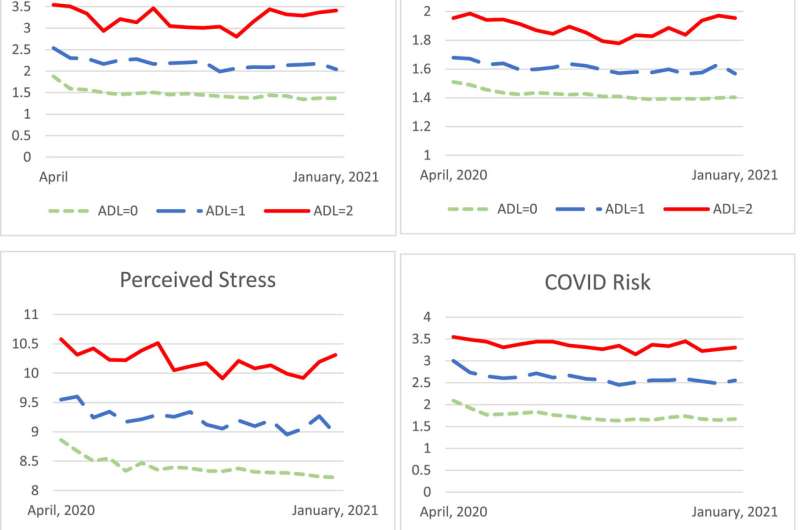Pandemic-induced mental distress higher among those with disabilities

New research from the University of Toledo suggests there is an urgent, unmet need for stronger mental health support among people with disabilities as the COVID-19 pandemic continues.
"Mental health has become another pandemic within COVID-19. The need for support has been emphasized broadly, but not necessary for individuals living with disabilities," said Dr. Ling Na, an assistant professor of public health at UToledo. "We need to do better at understanding their specific needs and finding ways to support them."
Na recently led a study that used a national survey of more than 6,400 Americans about their anxiety and depression, psychological risk factors, resilience and coping mechanisms on a bi-weekly basis from March 2020 through January 2021.
Researchers sorted participants into three groups—those who reported no disability; those who reported a disability that affects their mobility or their ability to perform routine self-care activities; and those who had disabilities that affected both mobility and self-care.
The analysis found a strong association between the number of disabilities an individual experiences and their level of mental distress. It also found individuals with disabilities reported higher levels of what researchers call perceived adversities, including stress, loneliness and their personal assessment of the risk COVID-19 poses to their life or finances.
At the same time, the more disabilities someone had, the less they were able to effectively adapt to the adversity brought on by the pandemic—meaning they were ill-prepared to manage their mounting stress and worries.
The findings were recently published in the Disability and Health Journal. The research also was selected for a brief presentation last week at the American Public Health Association's 2021 Annual Meeting and Expo.
While Na said the results were not surprising, the data are urgently needed in order to appropriately respond to the pandemic in a vulnerable but not well-studied segment of the population.
"This is a chance for us to explore their reality of life and what it looks like in a pandemic," she said. "With the lockdowns and social isolation and social distancing rules, people with disabilities have faced tremendous barriers to receiving support for their daily living, accessing their care and taking care of their own mental and physical health—especially those who have mobility and self-care difficulties. Research about how this has impacted them through the pandemic is scarce."
Na's hope is that the study will provide a baseline for how individuals with disabilities are coping with the stresses put on them by the pandemic and what their resilience is to the challenges of COVID-19.
From that, policymakers and clinicians may be able to develop methods to build resilience and positive coping skills.
"This study highlights the importance of stress-coping education and intervention," she said. "Knowing this group, knowing their reality during the pandemic and finding ways to reduce the disparities in mental health is important for healthcare providers and others who support individuals with disabilities."
More information: Ling Na et al, Psychological and behavioral responses during the COVID-19 pandemic among individuals with mobility and/or self-care disabilities, Disability and Health Journal (2021). DOI: 10.1016/j.dhjo.2021.101216




















